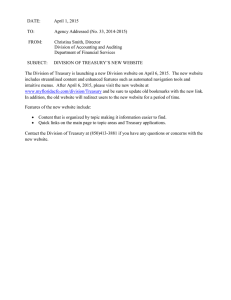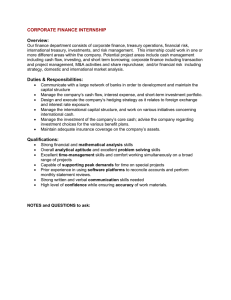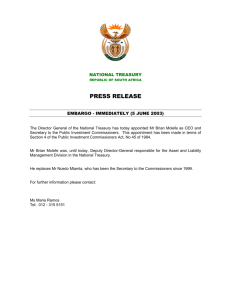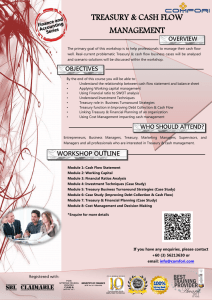Document 14486500
advertisement
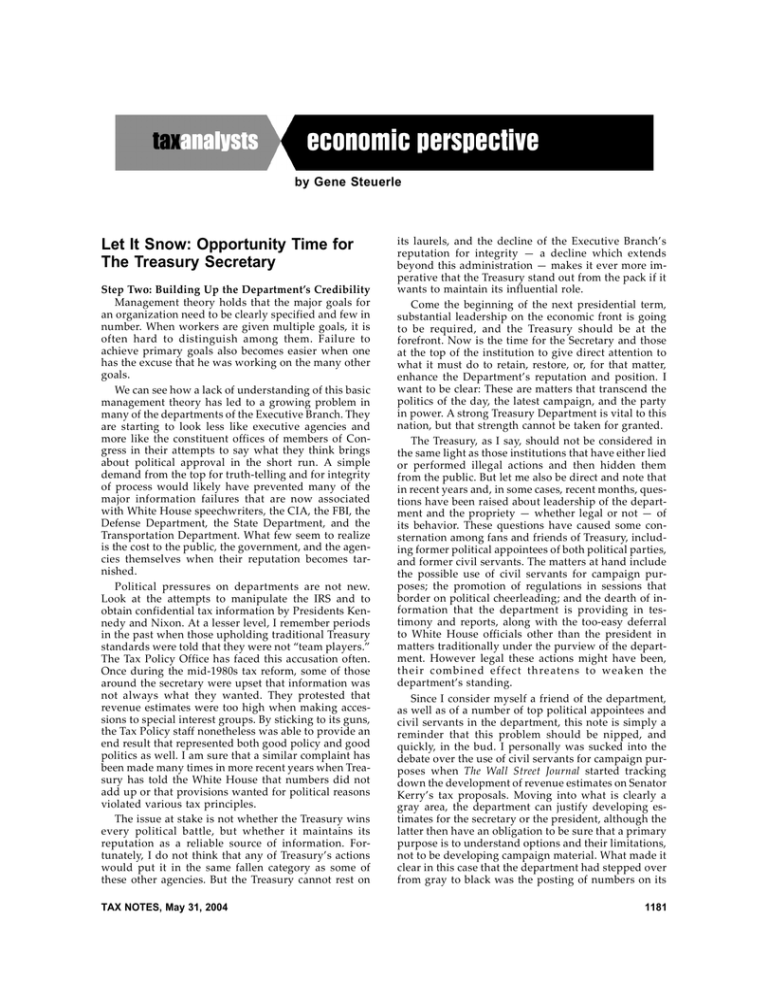
. b ,g ’d p D fy rh S lG iu m n otesco axN T by Gene Steuerle Let It Snow: Opportunity Time for The Treasury Secretary Step Two: Building Up the Department’s Credibility Management theory holds that the major goals for an organization need to be clearly specified and few in number. When workers are given multiple goals, it is often hard to distinguish among them. Failure to achieve primary goals also becomes easier when one has the excuse that he was working on the many other goals. We can see how a lack of understanding of this basic management theory has led to a growing problem in many of the departments of the Executive Branch. They are starting to look less like executive agencies and more like the constituent offices of members of Congress in their attempts to say what they think brings about political approval in the short run. A simple demand from the top for truth-telling and for integrity of process would likely have prevented many of the major information failures that are now associated with White House speechwriters, the CIA, the FBI, the Defense Department, the State Department, and the Transportation Department. What few seem to realize is the cost to the public, the government, and the agencies themselves when their reputation becomes tarnished. Political pressures on departments are not new. Look at the attempts to manipulate the IRS and to obtain confidential tax information by Presidents Kennedy and Nixon. At a lesser level, I remember periods in the past when those upholding traditional Treasury standards were told that they were not “team players.” The Tax Policy Office has faced this accusation often. Once during the mid-1980s tax reform, some of those around the secretary were upset that information was not always what they wanted. They protested that revenue estimates were too high when making accessions to special interest groups. By sticking to its guns, the Tax Policy staff nonetheless was able to provide an end result that represented both good policy and good politics as well. I am sure that a similar complaint has been made many times in more recent years when Treasury has told the White House that numbers did not add up or that provisions wanted for political reasons violated various tax principles. The issue at stake is not whether the Treasury wins every political battle, but whether it maintains its reputation as a reliable source of information. Fortunately, I do not think that any of Treasury’s actions would put it in the same fallen category as some of these other agencies. But the Treasury cannot rest on TAX NOTES, May 31, 2004 its laurels, and the decline of the Executive Branch’s reputation for integrity — a decline which extends beyond this administration — makes it ever more imperative that the Treasury stand out from the pack if it wants to maintain its influential role. Come the beginning of the next presidential term, substantial leadership on the economic front is going to be required, and the Treasury should be at the forefront. Now is the time for the Secretary and those at the top of the institution to give direct attention to what it must do to retain, restore, or, for that matter, enhance the Department’s reputation and position. I want to be clear: These are matters that transcend the politics of the day, the latest campaign, and the party in power. A strong Treasury Department is vital to this nation, but that strength cannot be taken for granted. The Treasury, as I say, should not be considered in the same light as those institutions that have either lied or performed illegal actions and then hidden them from the public. But let me also be direct and note that in recent years and, in some cases, recent months, questions have been raised about leadership of the department and the propriety — whether legal or not — of its behavior. These questions have caused some consternation among fans and friends of Treasury, including former political appointees of both political parties, and former civil servants. The matters at hand include the possible use of civil servants for campaign purposes; the promotion of regulations in sessions that border on political cheerleading; and the dearth of information that the department is providing in testimony and reports, along with the too-easy deferral to White House officials other than the president in matters traditionally under the purview of the department. However legal these actions might have been, t h e ir c om b in e d e ffec t t h re at e n s to w ea ke n t he department’s standing. Since I consider myself a friend of the department, as well as of a number of top political appointees and civil servants in the department, this note is simply a reminder that this problem should be nipped, and quickly, in the bud. I personally was sucked into the debate over the use of civil servants for campaign purposes when The Wall Street Journal started tracking down the development of revenue estimates on Senator Kerry’s tax proposals. Moving into what is clearly a gray area, the department can justify developing estimates for the secretary or the president, although the latter then have an obligation to be sure that a primary purpose is to understand options and their limitations, not to be developing campaign material. What made it clear in this case that the department had stepped over from gray to black was the posting of numbers on its 1181 COMMENTARY / ECONOMIC PERSPECTIVE Web site with a note how these taxes would impose burdens on “hard-working” Americans. At least in my memory, the department has never used Public Affairs to write and post attacks on proposals of any member of Congress. Any civil servant in Public Affairs who helped type or post that material has been inappropriately put on the spot. And any General Counsel attorney who has ventured forth an opinion that this is legal at a minimum has been put in the untenable position of being asked to justify actions that weaken the department’s standing with the public. What I am saying to the Treasury secretary and to the head of every office within Treasury is that you have an obligation not to let your staff be put in this position again. The action was not in keeping with the best long-term interest of the department. No civil servant should be put in such an awkward position. Period. If it hasn’t happened already, sessions need to be held for staff telling them how to keep within the spirit, not just the letter, of the law. Another digression from traditional Treasury practice has occurred in at least one session lately on forthcoming regulations. I hope there haven’t been more. Many regulations can be quite controversial. The intent of Congress is often less than perfectly clear, so much can be at stake. More often than not the law that Congress passes, especially when there are giveaways, is much more constrained than its supporters would like. Thus, Treasury has usually tried to treat these matters delicately, making it clear that its goal is not to legislate, but to interpret the law as clearly and in as professional a manner as possible, no matter where the chips may fall. For some reason, the Treasury was pulled into a cheerleading session on regulations related to health saving accounts. At a meeting in Treasury’s historic Cash Room, I got the feeling that the moderator was ready to claim that the industry groups in the room shouldn’t worry, the administration’s goal was to do everything it could to please each of them (which, if you know this area, is impossible because of the competing interests at stake and because doing so would actually work against one purpose of the bill, which is to help lower, not raise, health costs.) Of particular note was this moderator’s claim that those in the room needed to mobilize their forces in opposition to those fighting against them (Democrats? Health saving account opponents?). I confess that I do not have the precise wording of these statements, but the “them against us” tone was entirely inappropriate. It was 1182 probably just as well that the Employee Benefit Counsel, the primary official in charge of this area, was for the most part silent. Once again, however, he should not have been put in this spot in the first place. I remember one period a while ago when as a Treasury official I was invited to Commerce Department sessions not unlike the one I just described. The Commerce Department was meeting with interest groups on proposals leading to the Tax Reform Act of 1986, and it was essentially trying to curry favor by intimating that at least it, Commerce, was on their side. Treasury had the tougher role of saying, look, here’s what issues are at stake, why proposals were being put forward, and then requesting information and help. A small difference of degree? I don’t think so. Commerce was appealing to special interests, regardless of the public interest. Treasury was saying that it wanted to listen to special interests in its search to serve the public interest. A final area of concern is with the dearth of information from the department and the control over the department by White House officials other than the president. This issue is hardly confined to the current administration. Of course, the president sets the agenda. Of course, there are always special difficulties arising from campaigns, when both sides promise far more than can be delivered. The Treasury, however, must be in a position of showing just how the numbers do add up. It must be able to report to Congress on details of programs, even when those details force attention to issues that pure political types would just as soon avoid. Without an ability to report on the viability of the many programs under its jurisdiction, they will never be corrected. Moreover, by being regarded as a reliable source of information, the Treasury establishes a level of trust that allows it to exercise leadership at crucial stages. While all these lapses are minor compared to what is happening in other departments, they reflect on the department in ways that can be detrimental to its overall influence. I strongly suggest that these potential problems quickly be brought under control. Following the election of 2004, the nation will be forced to make some wrenching budgetary decisions that both candidates so far are dodging. These decisions will fully engage the Treasury Department, and its leadership is necessary for finding some solutions. My friends in the department, you need to lead from strength. Exercise your power wisely now so you are ready. TAX NOTES, May 31, 2004
